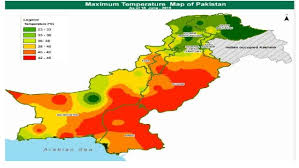By Muhammad Luqman
Pakistan’s annual average temperature has increased by roughly 0.5°C, over the last five decades, resulting in increased frequency of heat wave days per year.
“Precipitation has shown high variability but has slightly increased in the last 50 years,” According to the Climate Change Profile of Pakistan report the Asian Development Bank,
Sea level along the port city of Karachi has risen approximately 10 centimeters in the last century, devouring thousands of hectares of coastal lands.
The report r warned that the annual temperature in Pakistan is expected to rise by 3°C to 5°C due to a central global emissions scenario, while higher global emissions may yield a rise of 4°C to 6°C.
Predicting the future scenario of the sea-level rise, the report said that the sea-level will to go up by a further 60 centimeters by the end of the century and affect the low-lying coastal areas south of Karachi toward Keti Bander and the Indus River delta.
According to the report, Pakistan is expected to experience increased variability of river flows due to increased variability of precipitation and the melting of glaciers.
Climatic changes might potentially bear various negative effects on South Asian nation’s farm productivity and water availability, increase coastal erosion and seawater incursion and frequency and intensity of extreme weather events.















